Archive
25 April 2018
Next step towards quantum network based on micromechanical beams

In recent years nanofabricated mechanical oscillators have emerged as a promising platform for quantum information applications. Quantum entanglement of engineered optomechanical resonators would offer a compelling route towards scalable quantum networks. Researchers at the TU Delft and the University of Vienna have now observed this entanglement and report their findings in this week’s edition of Nature.
20 April 2018
Researchers build DNA replication in a model synthetic cell
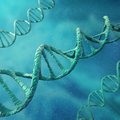
Researchers at Delft University of Technology, in collaboration with colleagues at the Autonomous University of Madrid, have created an artificial DNA blueprint for the replication of DNA in a cell-like structure.
19 April 2018
100,000 euros for new design course of Applied Physics
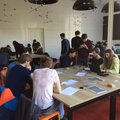
The National Governing Body for Education Research (NRO) will make available an amount of €100,000 for the new Applied Physics course ‘Design Engineering for Physicists’. The NRO has honoured an application by Prof. Chris Kleijn, Dr. Rolf Hut (CitG/TNW), Dr. Koen van Dongen (TNW) and Prof. Marc de Vries (TNW) for a Comenius Senior Fellowship.
13 April 2018
NWO grant of €17 million for the development of electron microscopy in the Netherlands
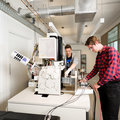
The Netherlands Organisation for Scientific Research (NWO) has awarded a grant of more than 17 million euros for the further development of the Netherlands Electron Microscopy Infrastructure (NEMI). The network consists of five university medical centres and eight universities, with Utrecht as the coordinating university. The grant will enable the scientists to combine various technologies in the field of electron microscopy and as a result to learn more about the composition and coherence of the biological and material micro-world.
28 March 2018
Majorana trilogy completed
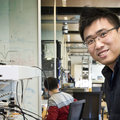
Since the breakthrough discovery of the Majorana particle in 2012 in Delft, researchers faced great challenges. An international team of researchers from the Netherlands (QuTech, Microsoft and Eindhoven University of Technology) and United States (JQI Maryland, UC Santa Barbara) joined forces to understand the next steps required to improve the experiments. Now, the scientists provide a complete toolbox for the final proof of Majorana existence, paving the way towards Majorana quantum bits. They publish their work in Nature.
22 March 2018
Potassium gives new generation perovskite-based solar cells an efficiency boost

A simple potassium solution could boost the efficiency of next-generation solar cells, by enabling them to convert more sunlight into electricity.
22 March 2018
2018 Stockholm Water Prize for TU Delft biotech pioneer Mark van Loosdrecht
Professors Mark van Loosdrecht (Delft University of Technology) and Bruce Rittmann (Arizona State University) are named the 2018 Stockholm Water Prize Laureates for revolutionizing water and wastewater treatment. By developing microbiological processes in wastewater treatment, they have demonstrated the possibilities to cut costs, reduce energy consumption and even recover chemicals and nutrients for recycling. Their pioneering research and innovations have led to a new generation of energy-efficient water treatment processes that can effectively extract nutrients and other chemicals – both valuable and harmful - from wastewater.
21 March 2018
Mystery of superior Leeuwenhoek microscope solved after 350 years
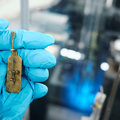
Researchers from TU Delft and Rijksmuseum Boerhaave have solved an age-old mystery surrounding Antonie van Leeuwenhoek’s microscopes.
19 March 2018
Challenging the physical limits of a computation
Researchers from Delft University of Technology, in collaboration with the University of Zaragoza, have now erased and stored one bit of information encoded in a quantum nanomagnet while measuring the amount of energy dissipated in the process.
02 March 2018
Wind energy: driving down costs

Despite its recent growth, there’s still a lot of room for cost reductions in wind energy. That’s the view given by prof.dr. Simon Watson in his inaugural lecture at TU Delft on Friday March 2nd.